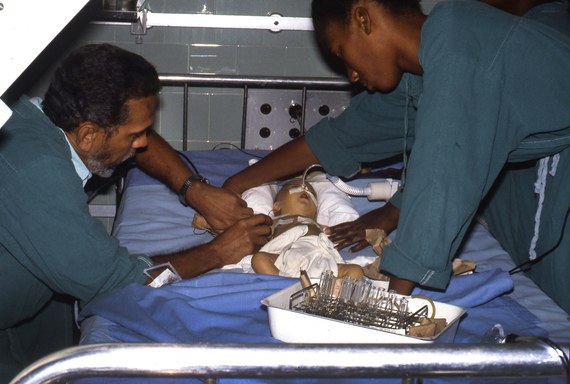A nurse slowly squeezed a manual respirator to keep the newborn breathing. Two physicians worked quietly and methodically on the distressed child. We were in the critical care unit of the central pediatric hospital in Havana, Cuba. It was more than 15 years ago, but as I hear criticism about the normalizing of relations with Cuba today, it makes me wonder how much has changed since then.
A Grave Situation
I was photographing medical care for children at the invitation of a pediatrics official as part of a visit with friend and colleague Joe Moran of Church World Service. We were documenting the humanitarian work of Cuban Christians and others. Cuba has long emphasized quality health care, and many South American nations send patients to the island nation for care.
As I concentrated on photographing them, I was not aware of the gravity of their efforts. An X-ray negative was taped to a window. It revealed the baby had been born with a single lung.
As I looked through the viewfinder, concentrating on focus and composition, one doctor stood erect after having leaned over the child's bed. The nurse put down the respirator. The three laid their equipment aside and looked toward me. The child had died.
I leaned against the wall, shocked and humiliated by my lack of awareness. Tears welled in my eyes. And these people who had just completed heroic efforts to save this child came over to console me!
Embargo Results
As we talked, they explained the difficulties of caring for the child. His chances of survival were dire. One of the challenges was a lack of needles small enough for the tiny veins of newborns. As with many other medical supplies and equipment, they attributed the shortage to the U.S. embargo that had been in effect for the past 30 years.
Except for case-by-case humanitarian exemptions, medical supplies made in the U.S. were blocked from entering Cuba. And this had recently been extended to equipment under U.S. patent. This meant that materials from third party sources could not be imported if they were patented in the U.S.
This was only one of the hardships visited on the vulnerable, like this infant, that resulted from the embargo. The Cuban economy was anemic. Travel to the U.S. was prohibited. Remittances from family in the U.S. were limited. Trade with the U.S. was restricted.
Tourism from other nations was just beginning to attract foreign exchange, but a dual economy --one for tourists and one for locals -- only highlighted financial inequity. Life was hard for most people.
Putting the Past Behind Us
I thought of this experience when I heard of the agreement to normalize relations between Cuba and the U.S. I thought of the Cuban people: the children in the pediatric hospital, the pleasant old woman in a senior residence who told me with a smile as I was leaving, "Remember, you have a grandmother in Cuba," the teachers and children in the schools I visited, the farmers and the health care workers.
They are everyday people seeking to live meaningful, purposeful lives like you and me, under difficult circumstances made unnecessarily more difficult by political differences that have festered now for a half century.
I understand the Cold War ideology. I lived through it: the missile crisis, the political detainees, the human rights violations. But this baby had nothing to do with that. He was simply born into this world of hubris and hatefulness, without a fighting chance for survival.
Things have changed since my visit, but slowly and incrementally. And not enough to greatly improve the lot of most Cubans. The normalizing of relations will notch up the change. But it does not end the embargo. That requires an act of Congress.
It will be a political struggle. But this, too, must happen. So long as it continues, it undermines our best values, and punishes the innocent.
